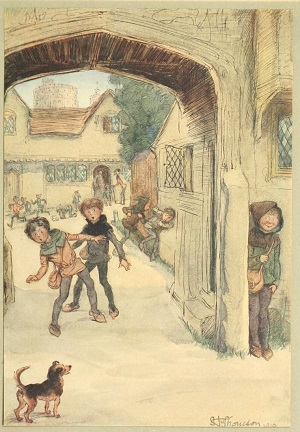| directory |
| home | contact |
|
|||||||||||||||
| search | |||||||||||||||
Shakespeare's Education and ChildhoodShakespeare probably began his education at the age of six or seven at the Stratford grammar school, which is still standing only a short distance from his house on Henley Street. Although we have no record of Shakespeare attending the school, due to the official position held by John Shakespeare it seems likely that he would have decided to educate young William at the school which was under the care of Stratford's governing body. The Stratford grammar school had been built some two hundred years before Shakespeare was born and in that time the lessons taught there were, of course, dictated primarily by the beliefs of the reigning monarch. In 1553, due to a charter by King Edward VI, the school became known as the King's New School of Stratford-upon-Avon. During the years that Shakespeare attended the school, at least one and possibly three headmasters stepped down because of their devotion to the Catholic religion proscribed by Queen Elizabeth. One of these masters was Simon Hunt (b. 1551), who, in 1578, according to tradition, left Stratford to pursue his more spiritual goal of becoming a Jesuit, and relocated to the seminary at Rheims. Hunt had found his true vocation: when he died in Rome seven years later he had risen to the position of Grand Penitentiary.Like all of the great poets and dramatists of the time, Shakespeare learned his basic reading and writing skills from an ABC, or horn-book. Robert Speaight in his book, Shakespeare: The Man and His Achievement, describes this book as a primer framed in wood and covered with a thin plate of transparent horn. It included the alphabet in small letters and in capitals, with combinations of the five vowels with b, c, and d, and the Lord's Prayer in English. The first of these alphabets, which ended with the abbreviation for 'and', began with the mark of the cross. Hence the alphabet was known as 'Christ cross row' -- the cross-row of Richard III, I, i, 55. A short catechism was often included in the ABC book (the 'absey book' of King John, I, i, 196). (10)In The Merry Wives of Windsor, there is a comical scene in which the Welsh headmaster tests his pupil's knowledge, who is appropriately named William. There is little doubt that Shakespeare was recalling his own experiences during his early school years. As was the case in all Elizabethan grammar schools, Latin was the primary language of learning. Although Shakespeare likely had some lessons in English, Latin composition and the study of Latin authors like Seneca, Cicero, Ovid, Virgil, and Horace would have been the focus of his literary training. One can see that Shakespeare absorbed much that was taught in his grammar school, for he had an impressive familiarity with the stories by Latin authors, as is evident when examining his plays and their sources. Please see the article Shakespeare's School Days for an extensive list of the books Shakespeare would have read. Even though scholars, basing their argument on a story told more than a century after the fact, accept that Shakespeare was removed from school around age thirteen because of his father's financial and social difficulties, there is no reason whatsoever to believe that he had not acquired a firm grasp of both English and Latin and that he had continued his studies elsewhere. The famous quotation from Nicholas Rowe's notoriously inaccurate biography of Shakespeare (written in 1709), where he claims that Shakespeare "acquir'd that little Latin he was Master of" and that Shakespeare was prevented by his father's poor fortune from "further Proficiency in that Language", should be read with an extremely critical eye. There are other fragmented and dubious details about Shakespeare's life growing up in Stratford. He is supposed to have worked for a butcher, in addition to helping run his father's business. There is a fable that Shakespeare stole a deer from Sir Thomas Lucy at Charlecote, and, instead of serving a prison sentence, fled from Stratford. Although this surely is a fictitious incident, there exists a few verses of a humorous ballad mocking Lucy that have been connected to Shakespeare. "Edmond Malone records a version of two verses of the Lucy Ballad collected by one of the few great English classical scholars, Joshua Barnes, at Stratford between 1687 and 1690. Barnes stopped overnight at an inn and heard an old woman singing it. He gave her a new gown for the two stanzas which were all she remembered": Shakespeare's daily activities after he left school and before he re-emerged as a professional actor in the late 1580s are impossible to trace. Suggestions that he might have worked as a schoolmaster or lawyer or glover with his father and brother, Gilbert, are all plausible. So too is the argument that Shakespeare studied intensely to become a master at his literary craft, and honed his acting skills while traveling and visiting playhouses outside of Stratford. But, it is from this period known as the "lost years", that we obtain one vital piece of information about Shakespeare: he married a pregnant orphan named Anne Hathaway. For a fascinating look at what Shakespeare's daily life would have been like growing up in Stratford, please see the book excerpt Country Life and Character in Elizabethan Enlgand. How to cite this article: References Bentley, Gerald Eades. Shakespeare: A Biographical Handbook. New Haven: Yale UP, 1968. Speaight, Robert. Shakespeare: The Man and his Achievement. New York: Stein and Day, 1977. ______________ More Resources |

More to Explore
|
©1999-2021 Shakespeare Online. All Rights Reserved.